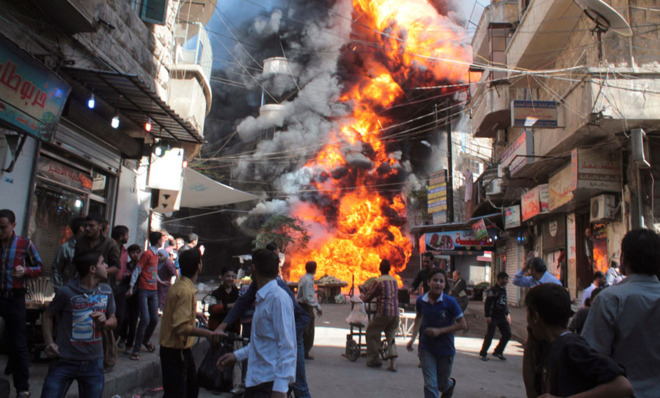The Sunni-Shiite war
Syria's civil war has devolved into a brutal sectarian conflict that could engulf the entire region

Why is Syria so pivotal?
The conflict in Syria began in March 2011 as a pro-democracy movement, like other Arab Spring uprisings. But as foreign fighters have poured in on both sides, the rebellion has morphed into a sectarian civil war that other Islamic nations see as pivotal for the entire region. Syria is the only Middle Eastern country that has a majority Sunni population but is ruled by a Shiite minority. The Assads, who took power in 1970, are Alawites, a subsect of Shia Islam that broke away in the 9th century. Together with orthodox Shiites, Alawites make up just 13 percent of the population, yet they have dominated the government, business, and the country's aristocracy. Now that the regime has lost control of half of Syria, the Alawites and other Shiites fear the wrath of the Sunni majority, and they are appealing for help from Shiites abroad. The Sunni rebels have also asked fellow Sunnis for aid, arms, and fighters.
Are the two sects radically different?
Subscribe to The Week
Escape your echo chamber. Get the facts behind the news, plus analysis from multiple perspectives.

Sign up for The Week's Free Newsletters
From our morning news briefing to a weekly Good News Newsletter, get the best of The Week delivered directly to your inbox.
From our morning news briefing to a weekly Good News Newsletter, get the best of The Week delivered directly to your inbox.
No more so than Catholicism and Protestantism. Both Sunnis and Shiites follow the five pillars of Islam: revering Allah as the only god and Mohammed as his Prophet, praying five times a day, fasting during Ramadan, giving to charity, and making a pilgrimage to Mecca. The split occurred in the religion's infancy. When Mohammed died in 632, his followers argued over whether he should be succeeded by one of his fathers-in-law, Abu Bakr, or by one of his sons-in-law, Ali. Abu Bakr won, and became the first caliph. Ali, whose followers say Mohammed chose him as heir, briefly ruled as the fourth caliph but was assassinated in 661, and his son Hussein was killed fighting for the caliphate in 680.
Why did that split last?
It gave both groups their names, a strong sense of identity, and a different style of worship. Shiite or Shia comes from shi'at Ali, meaning followers of Ali, while Sunni means those who adhere to the Sunna, or sayings of the Prophet. In Shiite eyes, the defeat of Hussein bequeathed them a legacy of oppression and exclusion. They place great emphasis on identifying and venerating Mohammed's descendants as Allah's representatives on earth, and that leads them to give the clergy a central role in political life. Shiites are religiously obliged to follow the teachings of their clerics, imams, and ayatollahs. Sunnis, by contrast, have no formally organized clerical hierarchy but see Islam as accessible to anyone who studies devoutly. That belief allows for the rise of extremist fringe groups like al Qaida.
Have the two always fought?
A free daily email with the biggest news stories of the day – and the best features from TheWeek.com
No. For most of the 20th century, rulers in the Muslim world kept religion and politics largely separate. (An exception was the Saud dynasty in Saudi Arabia, which promoted Wahhabism, a puritanical strain of Sunni Islam.) The turning point was the Iranian Revolution of 1979 and the emergence of a Shiite theocracy. Since then, in political conflicts across the Muslim world, Iran has served as a sponsor to embattled Shiite minorities. Iran reached out to Lebanese Shiites, for example, creating and funding Hezbollah, its strongest militant proxy.
Is Iran sending fighters to Syria?
Indirectly, yes. The foreign influx to Syria started on the Sunni side. Rebels, frustrated that Western countries wouldn't send them weapons, turned to jihadists for help, including al Qaida sympathizers from across the region — especially Iraq (see below). This spring, Hezbollah jumped into the conflict on the side of the regime, apparently on the direct orders of Iran's Supreme Leader Ayatollah Ali Khamenei. "This battle is ours," Hezbollah chief Hassan Nasrallah said in May. There are now up to 4,000 skilled Hezbollah fighters, trained by Iran, battling rebel groups in Syria. The Sunni rebels have a new backer of their own: The Saudis are funding a militant leader in Syria with the aim of uniting the disparate Islamist militias under the banner of the Salafists, Sunni hard-liners.
What does that mean for the region?
Big trouble. In a broad sense, Saudi Arabia and Iran are competing for influence over the entire Middle East and are willing to fuel civil wars in pursuit of their goals. Many Sunni-ruled nations have large, restive Shiite populations, particularly Bahrain, Yemen, and Kuwait. Sunni rulers fear that these populations could become radicalized by the Syrian conflict and stage uprisings of their own. King Abdullah of Jordan, a Sunni, has warned of the danger of a "Shiite crescent" spreading across the Middle East. "The fires in Syria will blaze for some time to come," said Ryan Crocker, former U.S. ambassador to several countries in the region. "Like a major forest fire, the most we can do is hope to contain it."
Iraq on the brink
Two years after the U.S. pulled out of Iraq, the country is engulfed in violence and spiraling downward toward a full-on Shiite-Sunni civil war. The Shiite majority, which suffered brutal repression during the reign of Saddam Hussein, gained power after the U.S. invasion and occupation. But elections did not produce political stability or end the power struggle between Shiites, Sunnis, and Kurds. Prime Minister Nouri al-Malikihas sought to shore up his power by cracking down on the opposition and jailing Sunni leaders, deepening the Sunnis' sense of oppression. This year, Sunni resistance groups — some affiliated with al Qaida — have conducted a wave of bombings that have killed and injured hundreds of people virtually every week. More than 6,000 Iraqis have been killed in the last year, including 1,000 in September alone. The same Sunni jihadi factions are operating in both Syria and Iraq, moving back and forth across the border, and have formally merged into an organization they call the Islamic State of Iraq and the Levant. The group recently put out a video showing its fighters helping Syrian rebels capture an air base. "The spark has begun in Iraq, and the fire will grow, God willing," the narrator says.
-
 Cytomegalovirus can cause permanent birth defects
Cytomegalovirus can cause permanent birth defectsThe Explainer The virus can show no symptoms in adults
-
 Summer in Seattle: Outdoor dining like nowhere else
Summer in Seattle: Outdoor dining like nowhere elseFeature Featuring a patio with a waterfront view, a beer garden, and more
-
 Ari Aster revisits the pandemic, Adam Sandler tees off again and Lamb Chop gets an origin story in July movies
Ari Aster revisits the pandemic, Adam Sandler tees off again and Lamb Chop gets an origin story in July moviesthe week recommends The month's film releases include 'Eddington,' 'Happy Gilmore 2' and 'Shari & Lamb Chop'